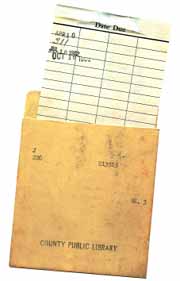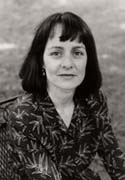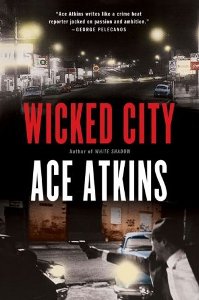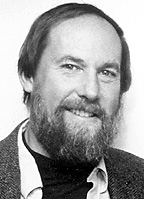
introducing readers to writers since 1995
April 13, 2008
Way past due
 Recently we told you about BOOKGASM's list of the nine most annoying people we always see at the bookstore, which proved to be a bit controversial.
Recently we told you about BOOKGASM's list of the nine most annoying people we always see at the bookstore, which proved to be a bit controversial.
Now, BOOKGASM contributor Louis Fowler lets loose with a list of the five people who make him hate the public library system. Yes, it's written in jest. No, not everyone realizes that.
But, hey, it's not all vinegar over at BOOKGASM this week, as witnessed by reviews of Jeffrey Ford's THE SHADOW YEAR, G.M. Ford's NAMELESS NIGHT, Richard Matheson's BUTTON, BUTTON, The New York Post's HEADLESS BODY IN TOPLESS BAR, Gary K. Wolf's SPACE VULTURE, Rayo Casablanca's 6 SICK HIPSTERS, Robert Bloch's Hard Case Crime twosome SPIDER WEB / SHOOTING STAR and more.
April 12, 2008
Mary Jo Salter, "Poetry Slalom"
Much less
the slam
than the slalom
gives me a thrill:
that solemn, no-fuss
Olympian skill
in skirting flag after flag
of the bloody obvious;
the fractional
lag,
while speeding downhill,
at the key
moment,
in a sort of whole-
body trill:
the note repeated,
but elaborated,
more touching and more
elevated
for seeming the thing
to be evaded.
 From A Phone Call to the Future: New and Selected Poems. Other new poems in this collection include "Point of View" and "A Phone Call to the Future," naturally enough—you can hear Salter read that poem as well.
From A Phone Call to the Future: New and Selected Poems. Other new poems in this collection include "Point of View" and "A Phone Call to the Future," naturally enough—you can hear Salter read that poem as well.
In an interview with New Letters, Salter describes her creative relationship with poetic form: "I'm interested in trying to find... an appropriate way of saying something. So, for me, temperamentally, rhyme and meter are pleasing. They help me say what I want to say, and I suppose that's been true ever since I was in college... [I]t's a hard balance to write poetry that does sound like a human being wrote it, and, on the other hand, not to be in any sense anti-intellectual, or to eschew your intellectual interests."
April 09, 2008
Visit the Wicked City

After finishing school at Auburn, Ace Atkins worked the crime beat as a reporter for The Tampa Tribune. During his time with the paper, he was nominated for a Pulitzer Prize as a result of his work on a series of articles investigating a decades-old murder.
Ace quit journalism to write fiction fulltime and published the novels Crossroads Blues, Leavin' Trunk Blues, Dark End of the Street, and Dirty South.
But he returned to that unsolved murder from Tampa for his critically acclaimed 2006 novel White Shadow. Carl Hiaasen said the book "is classic Florida noir, a great crime novel set in the fabulously crime-ridden '50s. Ace Atkins has done a superb job of re-creating old Tampa, a place whose underworld was as dangerous and debauched as Chicago's in its prime."
Now, Atkins turns to the sordid Phenix City in his homestate of Alabama. Journalists of the 1950's labeled the town "the wickedest city in America." And when do-gooder attorney Albert Patterson is mowed down by gunfire on a busy street, the state governor has to actually send in the National Guard to restore some semblance of order. But this isn't the Guard's fight.
Instead, the fate of Phenix City falls to normal citizens such as Lamar Murphy, a former boxer-turned-gas station owner. Murphy and a few other brave townspeople fight to purge the city of pimps, bootleggers, prostitutes, illegal gamblers, and crooked politicians in this gripping novel.
Filled with historical fact, this novel is a classic page-turner in the true sense of the phrase.
April 08, 2008
Tomaz Salamun, "Fiery Chariot"
The bull's berry walks on wires.
The windowpanes are wounds.
They hiss when the jet streams from the silver
kettle and a giant flings a discus.
It turns its head. The helmet touches the tip.
From Woods and Chalices, the most recent collection of Salamun's poetry translated into English (often by the poet himself) from the Slovenian. Three more poems from this collection, co-translated with Brian Henry, were published in Conjunctions. The two of them will be reading at NYU Thursday night.
You can also read Charles Simic's translation of "Folk Song," a version of "My Little Head, My Darling, I Love You" by Salamun and Joshua Beckman, and the marvelously self-referential "History," co-translated by Bob Perleman.
Stephen Dunn, "Madrugada"

No word for it in English, that time
between midnight and dawn. Most of us
are asleep by then, outrunning leopards
on blue lawns, or avenging our daily lives.
But in South America many are awake.
I see them dancing in the madrugada
all madrugada long. Even those working
quietly in their rooms at 3 A.M.—
it pleases me to think—are doing so
in the madrugada. I love how life nags
and language responds.
But if I were to fly to Caracas or Lima
to live the word and to say it out loud,
no doubt it would start to rhyme
with grunts from bar fights
and the muffled cries of women
forced into cars, and in dim-lit rooms
the silence of money sliding
into someone's hand. Madrugada,
I might say then, without pleasure,
its meaning so consonant with the world.
From Everything Else in the World. Other poems from this collection include "The Kiss." Last month, The New Yorker ran a new Dunn poem, "History."
In an interview with The Cortland Review, Dunn speaks to the importance of creative tenacity: "Poetry doesn't reveal its secrets to the occasional poet. Be as committed as, say, a violinist or a ballerina would be. No shortcuts. Young poets may be the only would-be artists I know who actually believe they might be able to pull something off because they have strong feelings about it and who are not embarrassed when they hit false notes. Finally, you must be a little driven, and what you're doing must be crucial to you in order not to be defeated by the likely neglect that awaits you, the lack of rewards, and the fact that, by and large, your culture doesn't take you seriously."
April 04, 2008
92Y's Video of Anne Carson's Multimedia Poetry Reading
This video is an excerpt from Anne Carson's recent 92nd Street Y event, "A Lecture on Pronouns in the Form of 15 Sonnets," which is sort of like a cross between a poetry reading and Laurie Anderson's United States. Neat! 92Y has always got something utterly fascinating going on; sometimes I wish I made the trek to the Upper East Side more often.
